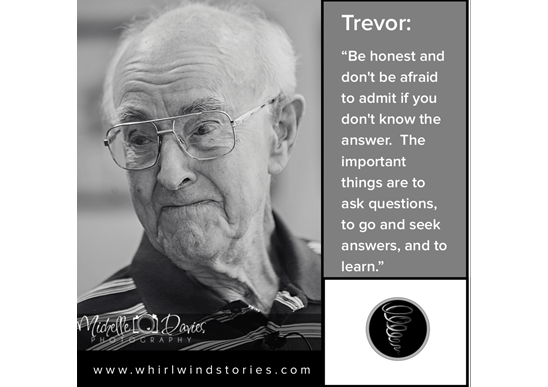Now 93 years of age, Wellington born Trevor Gollins and his older brother Graham (who would go on to fly Supermarine Spitfires in WWII) were the 5th generation of his family to have lived in Oriental Bay, his great-great-grandparents having been amongst the very first settlers.

Trevor recalls his childhood with fondness. Growing up as part of an ordinary middle class family, “life was very good”. One of his formative memories is of the occasion Trevor took it upon his 4-year-old unsupervised self to pull the bricks from under the wheels and get behind the steering wheel of his Father’s car. He lifted the handbrake, put the car into neutral, and as the car glided down the street toddler Trevor guided the car into a side street where it rolled to a stop. Calmly applying the handbrake, Trevor completed this exemplary piece of parking in time to see his Father running down the main road in panic, searching for his missing vehicle.
Shortly after his 7th birthday, Trevor had the thrill of meeting the famed Australian aviators Charles Kingsford Smith and Charles Ulm who had piloted the Southern Cross; the first ever plane to fly the Pacific from Oakland to Brisbane in 1928, and later that year the first plane to successfully cross the Tasman. Having wished them luck for their next challenge, “Smithy” replied “thank-you very much, little boy” instantly cementing his status as Trevor’s boyhood hero. He recalls his sadness at learning of Kingsford Smith’s premature death in 1935, whose body was never found after trying to break the record time for flying from the UK to Australia in a Lockheed Altair single engine aircraft.
His family moved to Hawera when he was 9, where he first met Noleen. He recalls that they used to fight “like Kilkenny cats” as small children in early 1930s Taranaki. Noleen and her family were to move away to Hawkes Bay within three years, but fate brought them together again almost 20 years later, and they were engaged within the month. This year, Trevor and Noleen celebrated their 63rd wedding anniversary.
When asked the key to marital longevity, Trevor offers a sage piece of advice: “Never go to bed on an argument!”
Within six weeks of returning from the war, where he served as a Wireless Operator in the Air Force, Trevor lost his Father, aged just 53, to blood poisoning in the days before penicillin was widely used in mainstream medicine. It’s almost inconceivable to us now, in the 21stcentury, that people should die of fairly routine infections, due to the lack of things such as antibiotics that we now take for granted. Astark reminder to us of just how much change the men and women of Trevor’s generation have lived through.
On the subject of change, Trevor succinctly reflects that despite technological advances, the world has become “a very unhappy place” due to the prevalence of “nincompoops and corruption”. Trevor believes that a cultural shift is needed to encourage more young people to pursue education in the sciences, instead of law doctorates and careers in finance, to improve the outlook for the world.
Both before and after the war, Trevor worked for the Post Office for short spells, before making a move into the insurance trade where he spent the bulk of his career. Trevor is proud to have been seen as trustworthy and honest in his business, in an industry not always known for such traits.
In the 1960s, Trevor served as chairman of the Wellington Road Safety Association for a time, during a period when the revolutionary notion of seatbelts was first introduced. Trevor recognised their importance from the outset and spearheaded a campaign to raise the profile of the idea, arranging for an Austin A35 and an Austin Saloon to have belts fitted and displayed at Wellington Railway Station for a week, in spite of some vocal dissident detractors. Eventually, through no small effort on the part of Trevor and his team, the Ministry of Transport were to make the use of seatbelts compulsory. Trevor was also instrumental in pushing for the introduction of police “mufti cars” and was the very first citizen to be invited to spend a day with officers on patrol in an operational mufti car.
A Type 1 diabetic for the last 46 years, Trevor served as National President of Diabetes New Zealand for 8 years and was made a life member when he stood down from the role. Trevor is immensely grateful to the wonderful care Sevenoaks Kapiti Retirement Trust have provided him over the 27 years he has been resident, reflecting his belief that there is still goodness and kindness in the world.
His advice to younger men is considered and concise:
“Be honest and don’t be afraid to admit if you don’t know the answer. The important things are to ask questions, to go and seek answers, and to learn.”


